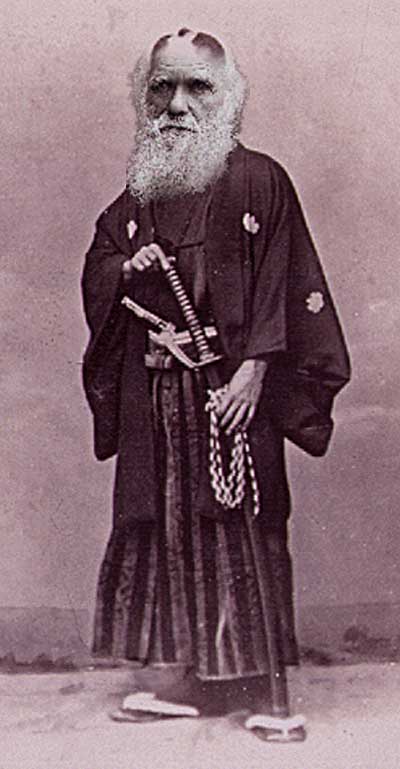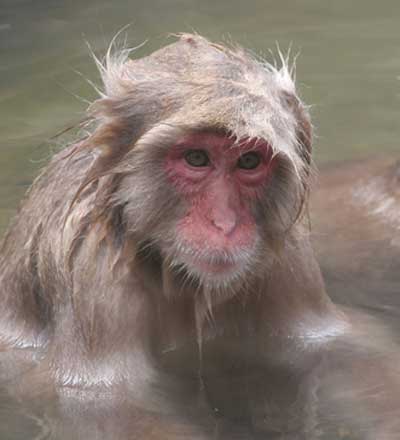What If Darwin had been Japanese?
- Complaining about the Mainland - 17th August, 2024
- New island designation – is it just greenwash? - 26th April, 2024
- Police and Crime Commissioners – a solution or a problem? - 21st April, 2024
By Ruth D’Alessandro, The Wildlife Gardener The Wildlife Gardener listened patiently as an Irish creationist explained how Noah loaded the ammonites, dinosaurs, woolly mammoths and giant sloths into the Ark. He pressed into my hand a copy of Answers magazine published by answersingenesis.org which I put in our downstairs toilet magazine rack alongside The Kitchen Garden, Grow Your Own, Money Week, The Beano and New Scientist. And then took it out again in case visitors thought we had gone a bit strange.

I settled down that evening to watch the BBC’s Around The World in 80 Faiths. A marvellously hippy open-minded Anglican vicar called Peter Owen-Jones travels round the world experiencing, with understanding and sincerity, other religions. Among other Far Eastern faiths, Owen-Jones was exploring Shintoism and Buddhism in Japan. Shinto is polytheistic, venerating natural objects such as mountains, rivers, water, rocks, and trees. Shinto rituals and celebrations stress harmony between deities, Man, and nature. Buddhists believe that all beings go through a succession of lifetimes in many forms of sentient life until Nirvana, the final, perfect stage of life is attained. By contrast, The Western Abrahamic monotheistic faiths; Christianity, Islam and Judaism place Man as a special being, higher than the animals (see, we even have a capital M). Orthodox Jews, Christians and Muslims believe that God created Adam from clay and Eve from Adam. On the subject of evolution, The Rabbinical Council of America (RCA) has “maintained that evolutionary theory, properly understood, is not incompatible with belief in a Divine Creator, nor with the first 2 chapters of Genesis.” Muslims believe that everything that happens is the will of Allah, so if a genetic mutation gives an organism an advantage leading to adaptation, that is God’s will. Timescales do not trouble Islam or Judaism: a day is a symbolic period of time ” it could be 24 hours or 7000 years, which makes a seven-day creation story more in line with geological time. Even the Catholic Church is now saying that the theory of evolution is compatible with the Christian faith. Creationists and proponents of intelligent design have not been invited to discuss the relationship between evolution and faith at Rome’s Pontifical Gregorian University on 3 to 7 March 2009 because arguments “that cannot be critically defined as being science or philosophy or theology did not seem feasible to include in a dialogue at this level”. Ouch. As a very old-fashioned Anglican (run away if anyone gets out a guitar) I have never been able to see any conflict between Christianity and evolution. Most of the vicars I have encountered who talk the most sense are those with first degrees in natural sciences or zoology. As I see it, the Christian message is about being kind, generous and forgiving, not about trying to prove that every word of a historically fragmented and continually-translated Bible is correct. As regards nature, give God the Big Bang and the rest is down to Darwin. And so to the fundamentalist Christian creationist view held by 50% of Americans, Britons and the aforementioned Irishman. He believes the Earth is 6000 years old, and that Noah loaded all the creatures into it including the dinosaurs and the mammals: In Genesis 6:19″20, the Bible says that two of every sort of land vertebrate (seven of the “clean” animals) were brought by God to the Ark. Therefore, dinosaurs (land vertebrates) were represented on the Ark. (www.answersingenesis.org). The Ark was apparently big enough to accommodate them: According to Genesis 6:15, the Ark measured 300 x 50 x 30 cubits, which is about 460 x 75 x 44 feet, with a volume of about 1.52 million cubic feet (www.answersingenesis.org again). Goodness ” Noah was quite an engineer. Charles Darwin in 1859 was up against similar Victorian creationist beliefs with On The Origin of Species. Yet the Victorians knew much more about their own faith and how difficult it was to translate and interpret sacred works. If The Bible was the word of God, then nature and the world around them was its chronicle. What better way of marvelling at God’s creation than by studying it scientifically, and interpreting what was found? Geology was a popular Victorian pastime, which made for lively debate about the age of rocks and those strange things in them. In the last 150 years Darwin’s theory has been underwritten by discoveries in geology, biology, medicine and physics. How thrilled would Darwin have been at Watson and Crick‘s discovery of the DNA double helix had he lived to see it? The Victorians are often, erroneously, portrayed as uptight, unyielding, austere people with closed minds. Yet when I read that only half of today’s Britons accept the theory of evolution, I wonder who is the more open-minded. Which brings me to ask the title question: What if Darwin had been Japanese? Well, for one thing, we may never have heard of him. This is not because the Japanese did not go on Beagle-like expeditions: they did (check out Tanaka Shosuke and Christopher and Cosmas), but rather he would have roused no controversy writing about the interconnectivity of all beings, and the interpretation that Man and apes are related. Indeed, the Japanese delight in their close relationship with the native macaques:

The thought of being related to such delightful creatures is not a dreadful one. Quite simply, the Japanese Shinto/Buddhist reaction to Darwin’s theories would have been: “Tell us something we don’t already know”. As any PR guru can tell you, bad publicity is good publicity. If there is no controversy to publicise, interest soon wanes. A Japanese Darwin’s published theory may have had some interested readers, but enough to spawn a worldwide bestseller at that time? I think not. By an accident of birth, Mr Darwin arrived in Shropshire rather than Kyoto. And thanks to that, the Junior Wildlife Gardeners can look forward to some fascinating Darwin-themed visits, projects and discussions this half term.


A fascinating article from an interesting angle!
I can’t believe the statistic about today’s Britons….it makes you weep.